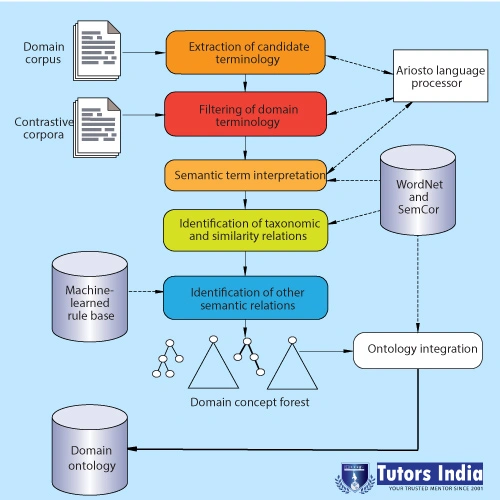An overview on Ontology learning algorithm and its Future research scope
Introduction
The high manual cost of ontology construction, the constant change in science and knowledge in general, the enormous amount of existing text with numbers growing exponentially, and the extensive need for a variety of ontology type resources such as vocabularies, taxonomies, and formal taxonomies are all driving forces behind Ontology Learning.
Interested with the introduction of the ontology computer dissertation topic ideas, Want to explore more interesting and scopeful topic ideas for your research paper. Searching for the Computer science thesis writing help uk contact us info@tutorsindia.com
Because of their widespread usage in Internet-based applications, ontologies have earned a lot of popularity and recognition in the semantic web. In all artificially intelligent systems, ontologies are frequently regarded as a valuable source of semantics and interoperability. The exponential growth of unstructured data on the internet has made automated ontology extraction from unstructured text a hot topic in study. Several approaches based on a variety of techniques (machine learning, text mining, knowledge representation and reasoning, information retrieval, and natural language processing) are being presented to automate the process of ontology collection.
At Tutors India, we offer Computer science and Information Technology Research Guidance services – We deliver exceptional work where your dissertation will deserve publication without significant reworking or alternation.

Ontologies Learning Systems
In addition to the approaches utilized by each system in terms of the related goals to be performed, an overview of the system in terms of its creators, the purpose behind the ontology learning algorithm, and its application areas is provided.
- ASIUM is a semi-automated ontology learning system . The goal of this method is to extract semantic knowledge from texts and utilize it to transfer knowledge from one domain to another. ASIUM performs ontology learning tasks using linguistics and statistics-based approaches, such as preprocessing texts and identifying sub categorization frames, extracting words and form ideas, and creating hierarchy.
- Text-to-Onto is a semi-automated system that is part of the KAON infrastructure for ontology maintenance. KAON is a complete set of tools for creating and managing ontologies. Text-to-Onto performs ontology learning tasks such as preparing texts and extracting words, creating ideas, constructing hierarchy, identifying non-taxonomic connections, and labeling non-taxonomic relations using linguistics and statistics-based approaches.
- TextStorm/Clouds, a semi-automated ontology learning system, is part of the Dr. Divago idea exchange and generating system. The goal of this method is to create and develop a domain ontology that can be used in Dr. Divago to find resources in a multidomain environment and make musical compositions or graphics. TextStorm/Clouds performs ontology learning tasks such as preprocessing texts and extracting words, creating hierarchy, identifying non-taxonomic connections, labelling non-taxonomic relations, and extracting axioms using logic and linguistics-based approaches.
- SYNDIKATE is a self-contained automated ontology learning system . SYNDIKATE performs ontology learning tasks such as extracting words, creating ideas, constructing hierarchy, finding non-taxonomic connections, and labelling non-taxonomic relations entirely using linguistics-based approaches.
- Under the Federated European Tourist Information System6, OntoLearn is part of a project to build an interoperable infrastructure for small and medium companies in the tourism industry (FETISH). OntoLearn performs ontology learning tasks such as preparing texts and extracting words, generating ideas, and constructing hierarchies using linguistics and statistics-based approaches.
- CRCTOL is a system for building ontologies from domain-specific documents that stands for concept-relation-concept tuple-based ontology learning. CRCTOL performs ontology learning tasks such as preparing texts, extracting words and creating ideas, constructing hierarchy, and identifying non-taxonomic connections using linguistics and statistics-based approaches.
- The OntoGain system, developed by the Technical University of Crete, is aimed at the unsupervised extraction of ontologies from unstructured text. In two distinct fields, namely the medical and computer science domains, OntoGain was compared to Text2Onto, the successor of Text-Against-Onto. To conduct ontology learning tasks such as preparing texts, extracting words and creating ideas, constructing hierarchy, and discovering non-taxonomic connections, OntoGain employs linguistics and statistics-based approaches
Our Tutors India supports all your programming, coding & algorithm development needs. We have a team of experts who can handle coding and algorithms for all your engineering projects. You hire Tutors India experts to develop your Computer Science dissertation research project.
Future scope
There are numerous important issues that will likely define future research directions in this area [ (1) the problem of authority, noise and rationality in Web data for ontology learning; (2) the combination of social data into the learning procedure to include consensus into ontology structure; (3) the plan of new techniques for manipulating the structural richness of collaboratively maintained Web data; and (4) the representation of ontological entities as lattices. (5) the suitability of present techniques for learning ontologies for different writing systems (e.g., alphabetic, logographic); (6) the competence and robustness of present techniques for Web-scale ontology learning; (7) the growing importance of ontology mapping as more ontologies become available; and (8) the extensibility of existing lightweight ontologies to formal ones.
Conclusion
Ontology learning techniques and applications is a growing topic of study that aims to make the process of ontology engineering easier. Another key purpose for OL is to make it easier to keep ontologies up to current. The assessment of ontologies is an unresolved subject, and numerous innovative techniques have been presented. In the OL field, a variety of methods and tools are being developed. There is no one approach that will be effective by itself; instead, a combination of them is advised based on the application problem. Web-scale, open heterogeneous data repositories, social networks, formal languages, and cross-language learning are some of the open research topics connected to ontology learning.
About tutors India
With our team of skilled expertise, Tutors India offers algorithm development services to scholars across the world. Our expert, Computer Science writers handle different methodologies and reflect real-world scenarios in a simplified model. And we also help in building new techniques.
Reference
[1] Asim, M. N., Wasim, M., Khan, M. U. G., Mahmood, W., & Abbasi, H. M. (2018). A survey of ontology learning techniques and applications. Database, 2018.
[2] Faure, D., & Nedellec, C. (1999). Knowledge acquisition of predicate argument structures from technical texts using machine learning: The system asium. Knowledge Acquisition, Modeling and Management, pp. 329-334.
[3] Chowdhury, G. G. (2003). Natural language processing. Annual review of information science and technology, Vol. 37, No. 1, pp. 51-89.
[4] Ochoa, J. L., Hernández-Alcaraz, M. L., Valencia-García, R., & Martínez-Béjar, R. (2011). A semantic role-based approach for ontology learning from spanish texts. International Symposium on Distributed Computing and Artificial Intelligence, Springer, pp. 273-280.
[5] Grandbastien, M., Azouaou, F., Desmoulins, C., Faerber, R., Leclet, D., & Quénu-Joiron, C. (2007). Sharing an ontology in education: Lessons learnt from the oural project. Advanced Learning Technologies, 2007. ICALT 2007. Seventh IEEE International Conference on, IEEE, pp. 694-698.
[6] Maedche, A., & Volz, R. (2001). The ontology extraction & maintenance framework text-to-onto. Proc. Workshop on Integrating Data Mining and Knowledge Management, USA, pp. 1-12.
[7] Hu, J., Li, Z., & Xu, B. (2016). An approach of ontology based knowledge base construction for chinese k12 education. Multimedia and Image Processing (ICMIP), 2016 First International Conference on, IEEE, pp. 83-88.
[8] De la Villa Moreno, M. Á. (2016). Método para la Construcción Automática de Ontologías Basado en Patrones Lingüísticos. Ph.D. thesis, ETSI Informatica.
[9] Ruiz Martínez, J. M. (2012). Metodología para la población automática de ontologías: aplicación en los dominios de medicina y turismo.

 Previous Post
Previous Post Next Post
Next Post